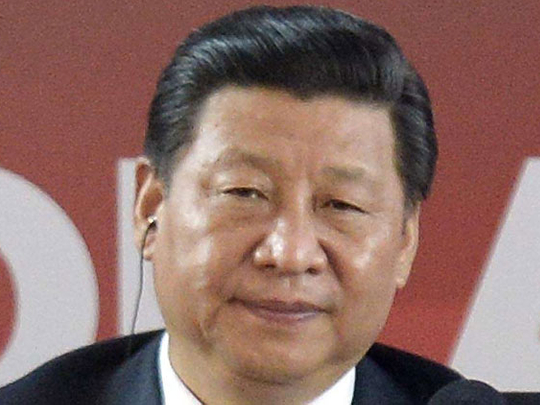
Caracas: Chinese President Xi Jinping signed a raft of oil and mineral deals with Venezuela on Monday, his latest stop on a Latin American tour showcasing China’s growing influence in the region.
During his four-country visit to what is often considered America’s back yard, Xi has reached out to resource-rich countries such as Venezuela and Argentina at a time when they are often shunned by the United States and Europe.
In Venezuela, he visited the mausoleum holding late president Hugo Chavez, an inveterate antagonist of the US, and signed 38 deals with Chavez’s successor, Nicolas Maduro.
The deals spanned a range of sectors from oil to infrastructure and included $4 billion for a joint development fund, $691 million to explore Venezuela’s gold and copper reserves and an agreement to develop the countries’ third joint satellite.
“Venezuela has become one of the top countries for Chinese investment... our seventh oil supplier and fourth Latin American trade partner,” Xi said in Caracas.
The Venezuela visit comes after the Chinese leader agreed to an $11-billion currency swap with Argentina and extended much-needed investment to President Cristina Kirchner, whose cash-strapped government, locked out of capital markets since defaulting on its debt in 2001, is staring down the threat of another default.
Xi kicked off his tour last week by proposing a new $20-billion infrastructure fund for Latin America, underlining the fast-growing Asian giant’s increasing interest in the region.
He also launched a new $50-billon development bank along with the other emerging powers of the so-called Brics group — Brazil, Russia, India and South Africa — at a summit in Brazil.
The move, which creates an alternative to the Western-dominated World Bank, was hailed as contributing to “a new international order” by Cuban President Raul Castro — Xi’s host at the next and final stop on his tour.
‘Not about ideology’
But although Xi has spent his trip rubbing elbows with leftist leaders who tend to view the United States with a critical eye, his tour is less about ideology than business, said Venezuelan political analyst Carlos Romero.
“China’s political and economic expansion is pragmatic in character. It’s not about ideology or competition with the United States, but a Chinese policy of looking long-term for natural resources in different parts of the world,” he told AFP.
“China knows Argentina and Venezuela hold huge natural resource deposits, particularly two they are desperately searching for to fuel an economy and a society like China’s: oil and food in the case of Argentina, and oil and gas in the case of Venezuela.”
The partnership comes at a welcome time for Venezuela, which is in the midst of an inflation crisis and struggling under a pile of unpaid debts to foreign firms.
China, the second-largest market for Venezuelan oil after the United States, pays for its average 640,000 daily barrels in part by writing down the $17-billion debt Caracas owes it.
Both countries have said they want to increase oil exports to one million barrels a day in the coming years.
Chinese trade with Latin America has grown rapidly in recent years, reaching $261.6 billion in 2013. China is now the second-largest trading partner of many countries, including Argentina and Cuba, and has been Brazil’s largest since 2009.
In 1990, China ranked just 17th on the list of Latin American export destinations.
Beijing has also ramped up investment in Latin America to about 20 per cent of its total foreign direct investment of $90 billion last year.
This is Xi’s second visit to Latin America and the Caribbean since taking office in 2013. Last year he toured Mexico, Costa Rica and Trinidad and Tobago.












